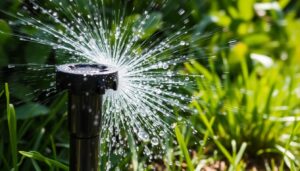Do you ever feel like your sprinkler system is trying to communicate with you? Perhaps it’s the persistent hissing noise that greets you every time you step outside, or the unsettling clanging and banging that echoes through your yard. You may find yourself wondering, ‘Why does my sprinkler system make so much noise?’
Well, fear not! In this article, we will delve into the inner workings of your sprinkler system to uncover the reasons behind its noisy behavior. From faulty valves to water hammer and air in the pipes, there are several culprits that could be causing these disruptions.
But don’t worry, it’s not all bad news. With proper understanding and maintenance, you can restore peace and tranquility to your outdoor oasis. So grab a cup of coffee and join us as we explore the world of sprinkler systems and discover how to silence those noisy nuisances once and for all.
Faulty Valves
The faulty valves in your sprinkler system are causing it to make noise, like a symphony of squeaks and hisses. These valves are responsible for controlling the flow of water through the system, and when they become worn or damaged, they can create various sounds that indicate their malfunction.
One possible cause of the noise is a valve that needs replacement. Over time, the seals inside the valves can wear out or become misaligned, leading to leaks and a loss of pressure. This loss of pressure can result in a turbulent water flow, which produces distinct noises such as squeaking or hissing. To address this issue, you should consider replacing any faulty valves with new ones that have properly functioning seals.
Another factor contributing to the noise could be water flow restriction within the valves themselves. If there’s any debris or mineral buildup present, it can impede the smooth movement of water through the valve openings. As a result, you may hear whistling or gurgling sounds as water tries to pass through these restricted areas.
Now let’s move on to another potential source of noise: water hammer.
Water Hammer
If you’re hearing a loud bang from your sprinkler setup, it’s likely because of water hammer. Water hammer occurs when the flow of water is suddenly stopped or changed direction, causing a shockwave to travel through the pipes and create that annoying noise.
To prevent water hammer and keep your sprinkler system running smoothly, there are a few steps you can take. Firstly, make sure that your system has an air chamber or cushion near the valves. This helps absorb the pressure caused by sudden changes in water flow and prevents the shockwave from forming. If your system doesn’t have an air chamber, consider installing one to alleviate the problem.
Another way to prevent water hammer is by using pressure-reducing valves (PRVs). These valves regulate the pressure in your sprinkler system and reduce any sudden spikes that could lead to water hammer.
Troubleshooting air in pipes can also help prevent this issue. Air bubbles can disrupt the smooth flow of water and increase the likelihood of water hammer occurring. To troubleshoot air in pipes, try draining all excess air from your sprinkler system by opening up each valve for a short period of time.
By preventing water hammer and troubleshooting air in pipes, you can ensure that your sprinkler system operates quietly and efficiently. In our next section about ‘air in the pipes,’ we’ll dive deeper into this topic without missing a beat.
Air in the Pipes
To prevent the annoyance of water hammer, you should address the issue of air in your pipes. When air becomes trapped in your sprinkler system, it can cause vibrations and loud noises as the water flows through the pipes. Troubleshooting tips for dealing with air in the pipes include checking for leaks or loose fittings that may be allowing air to enter the system. Inspecting and repairing any damaged or faulty valves can also help prevent air from getting into your sprinkler system. Additionally, ensuring that all valves are fully open when the sprinklers are running can help minimize the amount of air that gets trapped in the pipes.
Prevention methods for keeping air out of your sprinkler system include properly purging the lines before turning on your irrigation system each season. This involves opening all valves slowly to allow any trapped air to escape before fully opening them. Regular maintenance, such as flushing out any stagnant water, can also help prevent future issues with air in your pipes.
With proper troubleshooting and prevention methods for addressing air in your sprinkler system, you can ensure a quiet and efficient operation.
Moving on to clogged sprinkler heads…
Clogged Sprinkler Heads
Investigating a theory about clogged sprinkler heads reveals their potential to disrupt the smooth operation of your irrigation system. When the nozzles on your sprinkler heads become clogged with debris, such as dirt or small rocks, it can lead to uneven water distribution across your lawn or garden. This is because the clogged nozzles restrict the flow of water, causing some areas to receive more water than others.
As a result, you may notice patches of dry grass or plants that aren’t receiving enough moisture. To determine if your sprinkler heads are clogged, you can perform a simple inspection. Start by turning off the water supply and removing one of the sprinkler heads from its housing. Examine the nozzle for any signs of blockage, such as debris or mineral deposits. If you find any obstructions, carefully clean them out using a small brush or toothpick.
Addressing clogged sprinkler heads is essential for maintaining an efficient irrigation system. By ensuring that all nozzles are clear and free-flowing, you’ll help prevent uneven water distribution in your yard and promote healthy plant growth. However, if this issue persists even after cleaning the nozzles, it may be necessary to further investigate high water pressure as a possible cause for noise in your sprinkler system.
High Water Pressure
Excessive water pressure can wreak havoc on your irrigation setup, causing potential disruptions and compromising the overall efficiency of your system. When the water pressure in your sprinkler system is too high, it can lead to various issues such as noise, leaks, and even damage to the pipes. To ensure that your sprinkler system operates smoothly and quietly, it’s essential to regulate the water pressure.
To regulate water pressure in your sprinkler system effectively, consider implementing these techniques:
- Install a pressure regulator: A pressure regulator helps maintain a consistent and safe level of water pressure throughout your sprinkler system.
- Use flow control valves: Flow control valves allow you to adjust the water volume within each zone of your irrigation system, preventing excessive pressure buildup.
- Check for leaks: Regularly inspecting your sprinkler heads and pipes for leaks can help identify any areas where high water pressure may be causing noise or damage.
- Install noise reduction devices: Utilize noise reduction devices such as mufflers or silencers at key points in your irrigation setup to minimize noise created by high water pressure.
By implementing proper water pressure regulation techniques and incorporating noise reduction methods into your sprinkler system, you can prevent excessive noise levels caused by high pressures.
Now let’s move on to addressing another potential cause for noisy sprinklers – loose or damaged pipes.
Loose or Damaged Pipes
One interesting statistic is that loose or damaged pipes account for approximately 20% of all sprinkler system noise complaints. When it comes to the functioning of your sprinkler system, the integrity of its pipes plays a crucial role.
Pipe corrosion and water leaks are common culprits behind noisy sprinkler systems. Pipe corrosion occurs over time due to exposure to moisture and other environmental factors. This can weaken the pipes, making them more prone to vibrating and producing noise when water flows through them. Additionally, water leaks can lead to loose connections and cause the pipes to rattle or create a hissing sound.
To address this issue, it’s important to regularly inspect your sprinkler system’s pipes for signs of corrosion or damage. If you notice any visible rust or weakened areas, it may be necessary to replace those sections of pipe. In some cases, tightening loose connections with proper tools can also help reduce noise caused by vibrating pipes.
Moving forward into the next section about ‘improper installation,’ it’s crucial to consider how incorrect pipe placement can contribute to sprinkler system noise issues without compromising its overall functionality.
Improper Installation
Improperly installing your sprinkler system can lead to ongoing noise issues that may affect its overall performance. When the system isn’t installed correctly, it can result in improper wiring and inadequate water supply, causing various problems.
Here are some factors to consider:
- Incorrect Wiring: If the electrical connections aren’t properly made during installation, it can cause intermittent power surges or fluctuations, leading to buzzing or humming noises from the sprinkler system.
- Insufficient Water Supply: Inadequate water flow due to an undersized or poorly designed mainline can cause a high-pitched whining sound. This occurs when the sprinkler heads don’t receive enough water pressure to function optimally.
- Misaligned Pipes: Improper alignment of pipes during installation can create friction and turbulence within the system, resulting in rattling or banging noises.
- Loose Connections: If fittings and joints aren’t tightly secured, vibrations caused by water flow can cause them to loosen over time. This leads to annoying clanking or knocking sounds.
- Inadequate Backflow Preventer Installation: An improperly installed backflow preventer may cause excessive vibration and noise when water flows through it.
Improper installation of your sprinkler system can have lasting effects on its performance and create noise disruptions. Another factor that contributes to noise issues is low water pressure…
Low Water Pressure
Although it may seem frustrating, low water pressure can be easily resolved to ensure optimal performance of your sprinkler system. When it comes to irrigation system design, water pressure plays a crucial role in delivering the right amount of water to your lawn or garden.
Insufficient water pressure can result in weak or inconsistent sprinkler coverage, causing dry spots and uneven watering.
To address low water pressure, start by checking the main water supply valve for your sprinkler system. Ensure that it’s fully open to allow maximum water flow. Additionally, inspect the irrigation system’s pipes and valves for any leaks or blockages that may be affecting the pressure. Repairing any leaks and clearing any debris will help restore proper flow.
Another consideration is implementing appropriate water conservation techniques into your irrigation system design. This not only helps save precious resources but also optimizes water distribution throughout your landscape. Installing efficient sprinkler heads and using drip irrigation methods can significantly reduce water usage while maintaining adequate pressure.
By addressing low water pressure issues and incorporating effective irrigation practices into your system design, you can ensure that your sprinklers operate at their best capacity. With proper maintenance and care, you can minimize problems like sediment buildup that we’ll discuss next without skipping a beat.
Sediment Buildup
To prevent sediment buildup in your sprinkler system, regular maintenance is essential. Sediment refers to any solid material that settles at the bottom of your water supply and can accumulate over time. This buildup can lead to clogged nozzles, reduced water pressure, and decreased irrigation efficiency. By taking proactive measures, you can ensure that your sprinkler system operates smoothly and efficiently.
Here are three important reasons why addressing sediment buildup is crucial:
- Improved Water Quality: Sediment particles can contaminate your water supply, affecting its quality. Regularly removing sediment from your sprinkler system will help maintain clean and clear water for irrigation purposes.
- Enhanced Irrigation Efficiency: Sediment accumulation can obstruct the flow of water through the pipes and nozzles, leading to uneven distribution and wasted resources. Preventing sediment buildup ensures optimal irrigation efficiency.
- Prolonged System Lifespan: Sediment can cause corrosion or damage to various components of your sprinkler system over time. Regular maintenance helps extend the lifespan of your equipment by preventing unnecessary wear and tear.
To achieve a well-functioning sprinkler system with minimal noise, sediment buildup should be addressed alongside other routine maintenance tasks such as inspections and cleaning.
Regular Maintenance and Inspection
To ensure the optimal performance of your sprinkler system and prevent any disruptive noise, it’s crucial to prioritize regular maintenance and inspection.
Sediment buildup was previously discussed as a common cause of noise in sprinkler systems. However, by focusing on professional maintenance, you can effectively address this issue and contribute to the overall efficiency of your system.
Professional maintenance plays a vital role in keeping your sprinkler system functioning smoothly. Trained technicians have the expertise to identify potential problems before they escalate into major issues that may result in excessive noise or even system failure. They possess the necessary knowledge and tools to conduct thorough inspections and troubleshoot any existing concerns.
The frequency of inspection and troubleshooting depends on various factors, such as the size of your property, climate conditions, and water quality. Generally, it’s recommended to have a professional inspect your sprinkler system at least once a year. However, if you live in an area with harsh weather or notice any unusual noises or performance issues, more frequent inspections may be necessary.
By adhering to a regular maintenance schedule and entrusting professionals with the task of inspection and troubleshooting, you’ll proactively address any potential noise-causing problems in your sprinkler system while ensuring its longevity and efficient operation.
Frequently Asked Questions
Can the noise from my sprinkler system be caused by a faulty controller or timer?
If your sprinkler system is making noise, it’s possible that a faulty controller or timer is to blame. However, before jumping to conclusions, it’s important to troubleshoot other possible causes such as faulty sprinkler heads. These can create disturbances in water flow and lead to excessive noise. To address this issue, check for any clogs or leaks in the heads and replace them if necessary.
What are some common signs of sediment buildup in a sprinkler system?
To prevent sediment buildup in your sprinkler system, there are a few signs you should look out for. First, if you notice decreased water flow or uneven spray patterns, it could indicate sediment accumulation in the system.
Additionally, if your sprinkler heads become clogged or stop rotating properly, this may be due to sediment buildup. Regularly cleaning sprinkler heads by removing them and rinsing them with water can help prevent these issues and keep your system running smoothly.
How can I determine if my sprinkler system has low water pressure?
To troubleshoot low water pressure in your sprinkler system, start by checking the water source. Ensure that the main valve is fully open and there aren’t any obstructions or leaks.
Next, inspect the sprinkler heads for signs of clogging, such as reduced water flow or uneven spray patterns. Clean or replace any clogged heads to improve water pressure.
Additionally, consider installing a pressure gauge to accurately measure the system’s water pressure and make necessary adjustments accordingly.
Are there any specific warning signs to look out for in case of loose or damaged pipes in a sprinkler system?
To identify potential issues with your sprinkler system’s pipes, watch out for warning signs such as water leakage, reduced water flow, or damp areas around the pipes.
Loose pipes can cause these problems and should be addressed promptly to prevent further damage. Regularly inspecting your system and seeking professional assistance can help you detect any loose or damaged pipes early on and ensure an efficient and effective irrigation process.
Can the noise from a sprinkler system be caused by an inadequate power source or electrical issues?
Inadequate power source or electrical issues could potentially cause noise in a sprinkler system. Insufficient power can result in the valves not fully opening or closing, leading to vibrations and rattling noises. Electrical issues, like faulty wiring or loose connections, can also cause intermittent electrical currents, resulting in buzzing or humming sounds. It’s important to ensure that the power source is adequate and that all electrical components are properly installed and functioning to prevent these issues.

I’m Carlos Robert, a passionate gardener, and blogger. With years of experience and knowledge in the field of garden watering, I have created a blog to share my insights and tips on the topic. I strive to provide readers with detailed information about all aspects of sprinkler systems, from garden sprinklers to fire sprinklers, along with nozzles, hoses, and other related products. I love helping my readers create the perfect garden with their ideal setup!

